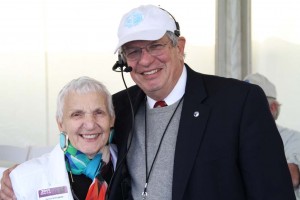
Denise McCluggage was an active participant in classic car events; shown here with Bill Warner at the Amelia Island Concours d'Elegance.
She’d probably ask, “Why all the fuss?” and then remind me a good life led should never be mourned. But as I struggle to find a way to put down all the words and memories that come to mind as I think of Denise McCluggage, I cannot but help but feel an emptiness at her passing.
In an era when everything is summed up in Twitter feeds, is there a way to easily contain her life? Just list all the basics and you will quickly run beyond the 140 characters allowed: writer, author and raconteur, champion race car driver and entrepreneur, competitive skier, photographer, role model, pioneer. And someone whose friendship was cherished by those who Denise invited into her life.
Denise McCluggage passed away on Wednesday, May 6 at the age of 88. It was, by normal measure, a long life, and yet for those who knew her, it ended way too soon.
“I was going back and forth with my team last night and somebody said the usual, ‘How sad…’” recalls David Reuter, the head of communications at Nissan North America. “ I said, ‘Yes, but no. It is sad when somebody passes, but with Denise you can’t help but be anything but inspired at the incredible life she led. Anyone that came in contact with her came away a better person for it. And that is anything but sad.’”
Denise McCluggage was born in El Dorado, Kansas and while she never embraced the conservative politics of the Plains States, Denise clearly inherited that unique pioneering spirit. She left for Mills College, in Oakland, California, at a time when relatively few women were getting degrees, graduating Phi Beta Kappa before starting her career in journalism at the San Francisco Chronicle.
She didn’t just bridle at the limitations of the era. She ignored them, becoming one of the first women to actively cover sports. She also developed a knack for being at the right place and meeting the right people.
In the early 1950s, she shared an upper flat in the City by the Bay. The lower apartment was rented to a struggling musician just starting to form the quartet that would eventually make him famous. But there was a better piano in Denise’s apartment and so, Dave Brubeck often would come upstairs to practice.
Denise met Briggs Cunningham at a yacht race. He was one of the first Americans to build cars for the legendary 24 Hours of Le Mans, and Cunningham encouraged Denise’s passion for speed. He didn’t actually need to work very hard at it. McCluggage once recalled how she became fascinated with cars as a six-year-old, spotting a Baby Austin parked on the street. She later asked Santa for one.
With the money from her Chronicle job, Denise bought one of the first MG TC sports cars in the country, then upgraded to a Jaguar XK 140. And even as she moved cross country, taking a sports writing job at the old New York Herald Tribune, Denise began to race professionally.
It was perhaps the most macho of the sports, and the men she competed with never quite knew how to handle Denise McCluggage. “She was a babe,” long-term auto journalist Don Vorderman once recalled, but she was also a frighteningly good driver, he quickly added. And it earned a mixture of admiration and fear, the organizers of the Le Mans endurance challenge repeatedly finding ways to keep her from racing there. It was one of the rare disappointments Denise would admit to.
But she rolled up plenty of victories while wearing her trademark white helmet with the pink polka dots. That included a win in the Grand Touring class at Sebring in 1961 driving a Ferrari 250 GT. She also scored a class win at the Monte Carlo Rally, three years later, in a Ford Falcon.
Officially, Denise ended her racing career in the late 1960s, but she continued to drive in semi-pro and amateur level events for nearly four more decades, only stopping when she felt she wasn’t at her peak on track anymore. But ask anyone who drove with Denise at the media events she continued to attend and they’ll quickly attest to her enduring skills.
Over the years, Denise’s life intersected with any number of celebrities, on and off the track, professional and otherwise. She would often head to the countryside in matching sports cars with actor and racing fanatic Steve McQueen. She was always assisting Miles Davis with his ongoing car problems. She married just once, to Michael Conrad who played the sergeant on the TV series, Hill Street Blues. It lasted just six months, but she remained friends with the actor until his own death.
Even while racing, Denise kept a camera close at hand, capturing some astounding images of a golden age of motor sports. She also helped expand the popularity of racing as the founding editor of Competition Press, a magazine that later was renamed Auto Week. She wrote for it until her death.
(Denise also wrote McBlog for TheDetroitBureau.com. In this column, she explained how racing was “the great authenticator.” And she also explained why “Joy Costs,” in this column.)
But Denise may have best summed up what made her so successful as a competitor in a 1977 book called the Centered Skier. It brought together the thrill of the hill with the meditative elements of Zen Buddhism. It is still popular with serious skiers.
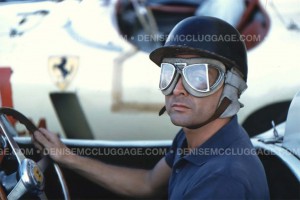
Some of Denise's photos, like this shot of Phil Hill, are available on her website, DeniseMcCluggage.com.
Indeed, those who take to the slopes owe some gratitude to Denise McCluggage. While working for the Herald Tribune she became an active proponent of the sport and helped spur the development of some of the big resorts in the New England region.
Her writing could be sharp and precise, but there was always a canny observation and her wry humor showed up in many ways. She was one of the first to buy a British SUV, and put the vanity license plate, “DOG” on her new Rover.
She collected an endless series of honors for her work, a Ken W. Purdy Award for Excellence in Journalism, the Dean Batchelor Lifetime Achievement Award, and a second lifetime honor from the International Automotive Media Association. Denise also became the first journalist to be inducted into the Automotive Hall of Fame.
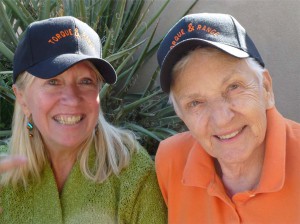
A recent shot shows Denise with auto journalist Sue Mead, who says, "There are those we just don't think we will ever lose."
“Denise was one hoot of a woman,” said veteran auto industry writer and PR woman Rosemarie Kitchin. “She opened a lot of automotive industry doors for other females. A lot of us owe her thanks.”
In recent decades, Denise McCluggage settled into a hillside home on the outskirts of Santa Fe, New Mexico, surrounded by the clutter of mementoes accumulated over the decades. It was an admirable ride, and one she wasn’t set to end. She continued to write actively, even as she began to experience some of the problems that are inevitable in one’s 80s. She also remained an active organizer of the annual Santa Fe Concorso.
But over the last year, health problems finally began to overcome Denise, complications from knee and hip replacements, unexplained anemia. And on Wednesday, she was rushed to the hospital, passing away hours later. She clearly would have wanted to go on living, but only under her own terms, much as she had addressed the previous 88 years.
“She was someone we could all relate to and envy for the life she lived,” said former General Motors PR chief Steve Harris, and a Santa Fe neighbor. “There won’t be another like Denise.”


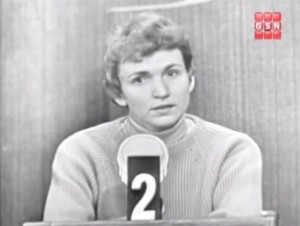
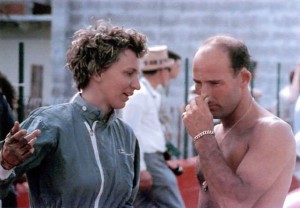
Paul,
This was an excellent tribute to an amazing lady.
Thanks,
Bill and Barbara Schaffer
R.I.P. Denise. You will be missed by so many people that you have deeply touched over the years with your wit and smile!
Excellent tribute to an excellent lady. (Dare I say, “who the —- are you calling a lady?”
We all miss her presence, stories and friendship.
I met her in 1988 at Mazda MPV test drive intro event for the first time. I didn’t know much about her background at that time. But, was impressed with her driving. Since then, I enjoyed every meeting we had. Thank you Denise for your guidance, wisdom and warm and caring friendship.
Always Inspired
Tom Matano
VERY well written, Paul. Thank you for capturing and sharing the spirit of Denise!
Kevin